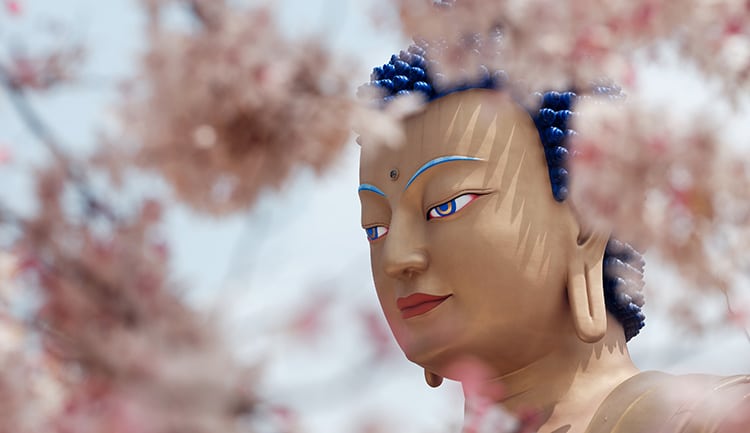Does Faith Play a Role in Meditation?
Category: Buddhist Meditation | How to Meditate

Meditation Strengthens Faith
When we have faith in something, we trust it completely. For many people, faith is reserved for the divine. It’s hard to place our complete trust in ordinary, imperfect people and things. But what about faith in meditation? Faith has a role to play in motivating us to practice and helping us overcome our doubts, whether or not we consider meditation a spiritual or religious practice.
A consistent meditation practice strengthens our faith. What exactly it strengthens our faith in depends on the type of meditation we do, and how we relate to the benefits we’ve received.
Some meditate as part of a religious or spiritual practice. Spiritual meditation is the process through which we connect to a higher power far beyond the individual self. Paradoxically, by single-pointedly examining the self in contemplative introspection, we develop insight which confirms authentic spiritual teachings. We realize our true nature is not at all separate from the ineffable supreme.
Outside of spiritual belief or religious dogma, meditation builds faith in the practice itself. When we’re new to meditation, we might doubt that it works. Some doubt is healthy. We may have heard anecdotes from others or read about its benefits, yet we’re still unsure if meditation will work for us.
But it’s faith, even if only a little, which motivates us to begin. With a leap of faith we take action and start a meditation practice, thereby gaining first hand experience of meditation’s benefits. Having experienced these benefits, our faith is reinforced and strengthened, inspiring us to continue along the path.
How Faith Benefits the Brain
Thanks to neuroplasticity, our brain is capable of adapting and changing and in fact, it always is. Our thought, speech and behavior is constantly reinforcing either old, bad habits or new ones. In some sense, we’ve already begun a meditation practice, even if unintentional. The question is, what has been the object of our focus?
If we stick with our same old harmful patterns of behavior, mistakenly believing we’re separate and ruminating on negative thoughts, we’ll strengthen the neurological pathways that keep us rooted in those tendencies. If we turn our attention instead toward foundational spiritual tenets such as behaving in a moral, compassionate manner, meditating on the true nature of reality and recognizing the potential good in everything, those new practices will someday evolve into character traits.
At first, choosing a new path and meditating intentionally is hard work. We are, after all, bushwhacking through the wilderness of the untamed mind. But the more we meditate, the more the new pathways become well-traveled, making it easier to continue. Studies of those who meditate daily find the frontal lobes activated, indicating spectacular concentration. Perhaps more importantly, the parietal lobes are at rest. In advanced meditators, there’s little to no activity in this region that’s responsible for establishing the separate self. This is one reason why it ‘feels’ spiritual to meditate. When the parietal lobe is deactivated, the boundaries between self and other become blurred, leaving us with an expanded sense of compassion and a feeling of connection to the higher, greater power of the divine.
Spiritual Benefits of Meditation
Spiritual meditation benefits are available even to those of us who do not see ourselves as spiritual. For someone of a particular religious faith, the following may seem divinely sourced.
- Heightened empathy
- Expanded compassion
- A sense of belonging
- A stable, less emotionally reactive mind
- A sense of inner peace, calm and stillness
- Self-confidence, self-esteem and willingness to be authentic
- A clear sense of life’s meaning and purpose
- Connection to an ever-present internal source of bliss
Faith in any omnipotent power aside, faith in meditation practice is all that’s needed to embody these characteristics.
Why Faith and Meditation are Important
Meditation is not in conflict with any authentic religion. Nor is belief in any religion required for meditation to work. We can meditate on scripture, sutras, and spiritual teachings just as we can meditate on our own body and breath. We might describe meditation’s benefits as spiritual, or as feel-good life improvements.
If the word ‘faith’ gives us pause, it may be helpful to replace it with ‘trust.’ If we at least have one mustard seed of trust in meditation as a means of feeling better, that’s enough to begin. Once we begin, our faith will grow and our doubt will dissipate, bit by bit, as we continue with our practice.






